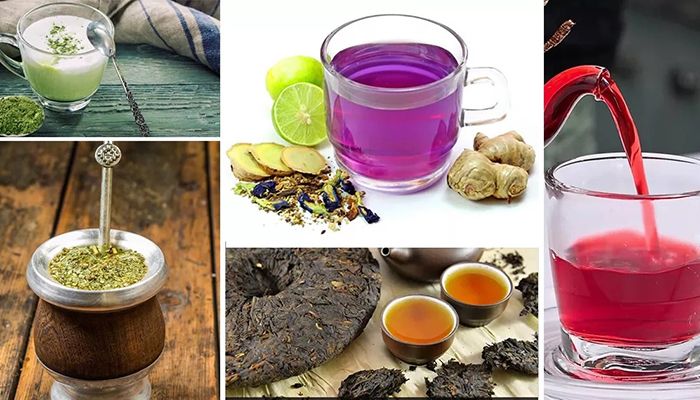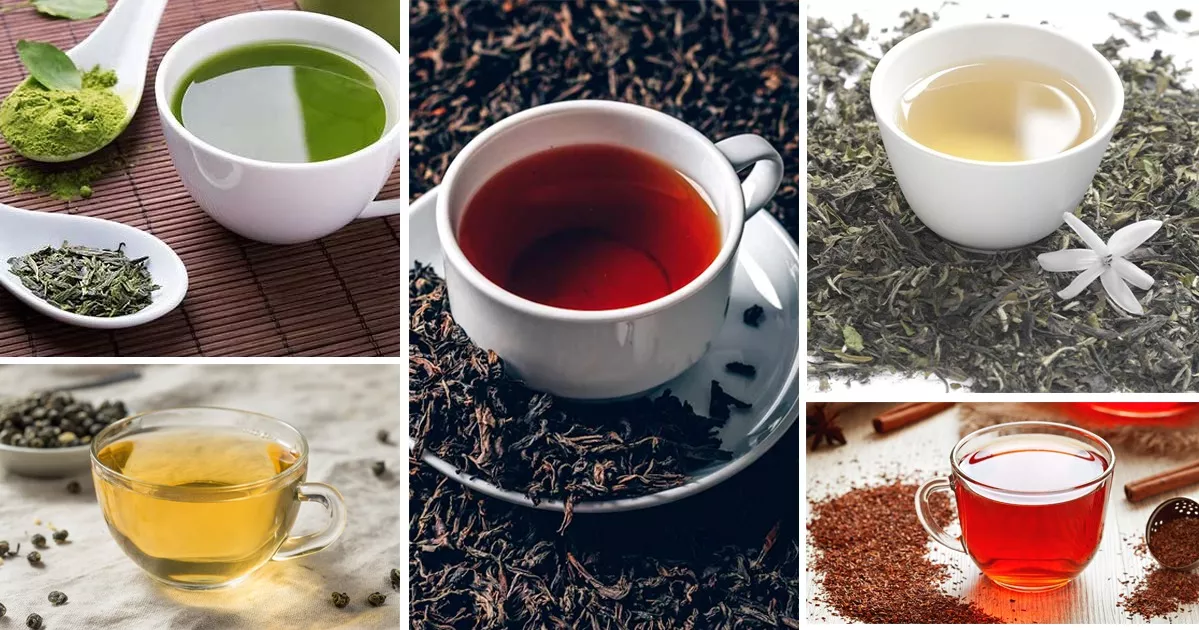
Desk Report
Publish: 06 Sep 2023, 04:29 pm

Different kinds of tea || Photo: Collected
In today's fast-paced world, the struggle with obesity is a prevalent concern. Obesity leads to various health complications. From heart disease to diabetes, the implications of carrying excess weight are far-reaching. However, the solution might be as simple as a comforting cup of tea. Several teas have been recognized for their potential to aid in weight loss. Let's explore the 10 best teas that promote weight loss. Here are 10 popular teas to shed extra pounds:
Green Tea
Green tea, a popular beverage, is made from the leaves of tea plants. It is scientifically known as Camellia sinensis. In Bangladesh, it's referred to as "Shobuj Cha." Renowned for its richness in antioxidants, particularly catechins, green tea offers numerous health benefits.
Consuming around 2 to 3 cups daily can provide a boost to metabolism and aid in the oxidation of fats. However, excessive consumption can cause hepatotoxicity.
Usually, green tea is brewed using 1 teaspoon of tea leaves and 150 ml of boiled water. The tea leaves need to be soaked at 61 °C to 87 °C for 30 seconds to 3 minutes, depending on the type of light or strong tea you prefer.
Oolong Tea
Oolong tea, is a semi-oxidized traditional Chinese tea that strikes a balance between green and black teas. It is derived from Camellia sinensis plants. In Bangladesh, it goes by "Ulong Cha."
Oolong tea offers a unique flavor profile. It is packed with polyphenols, theanine, and vitamins. Consuming 4 cups daily is safe for most people, according to WebMD. However, excessive intake could lead to caffeine sensitivity symptoms like mild to serious headaches and an irregular heartbeat.
Oolong tea supports digestion, enhances energy expenditure, and can aid in weight management. To prepare, first, boil the water at 80–90 °C. Then steep the leaves for 1–5 minutes. Now the Oolong tea is ready to enjoy.
Black Tea
Black tea is sourced from the Camellia sinensis plant, the same as green tea. In Bangladesh, this tea is referred to as "Rong Cha" or "Lal Cha." Loaded with theaflavins, thearubigins, and vitamins, black tea offers robust flavor and health benefits.
A daily intake of four cups of black tea is normally moderate for most people. But be cautious due to its high caffeine content. It supports metabolism, aids weight management, and provides a caffeine boost.
To make black tea, first boil 100 ml of water at 100°C. Then soak 1 teaspoon of tea in the water for about 6 minutes. You may enjoy it with sugar, milk, or lemon. But for weight loss, unsweetened black tea without sugar is recommended.
White Tea
White tea is also obtained from the tea plant, Camellia sinensis. This tea is normally called white tea, while in Bangladesh it’s known as Recognized as White Tea, or "Shada Cha."
White tea offers a delicate flavor and health benefits. This tea is abundant in catechins, flavonoids, and antioxidants. You can consume 2–4 cups daily to be safe. Overconsumption of white tea can lead to insomnia, dizziness, and gastrointestinal discomfort.
White tea supports fat breakdown, offers antioxidants, and enhances overall well-being. For a nice cup of white tea, first, boil 1 cup of water. Then pour it into a cup and add a tea bag to the water. Finally, steep for 2–3 minutes for the perfect taste.
Rooibos Tea
Rooibos tea is derived from the leaves of the rooibos plant, native to South Africa. The plant is called red bush and carries the scientific name Aspalathus linearis.
Rooibos tea is packed with nutrients like aspalathin and nothofagin. This caffeine-free herbal tea offers a unique taste and health benefits. Experts suggest drinking six cups daily. A large intake of rooibos tea can cause an increase in liver enzymes, which can potentially indicate liver problems.
To prepare rooibos tea, first boil 1 cup of water at 100 °C. After medium boiling, add 1 teaspoon of tea leaves. Then brew for 5–6 minutes, and your tea is ready to savor.

Matcha Tea
Matcha tea is a finely ground and specially processed tea, mainly produced in Japan. This tea is also made from the Camellia sinensis plant.
Matcha tea boosts metabolism, enhances focus, and is rich in antioxidants. It’s better to consume this tea in moderate amounts, like 1-2 cups daily. Drinking too much of this can cause diarrhea.
First, sift matcha into a mug to make matcha tea. In the mug, add 1/4 cup hot water, and whisk briskly for foam. Then pour 3 ⁄4 of the hot water and whisk for foam again. Your very own matcha tea is ready.
Mate Tea
Mate tea is a South American herbal tea. It comes from the plant yerba mate. Its scientific name is Ilex paraguariensis.
Mate tea is enriched with caffeine and theobromine. This invigorating tea offers a distinct taste. According to experts, consuming a daily cup of tea prepared from three grams of yerba mate leaves appears safe for a duration of up to 12 weeks. Having a large amount of yerba for a long time may cause some types of cancer.
Mate tea enhances focus, aids weight management, and promotes overall wellness. To prepare this tea, place 1-2 tablespoons of yerba mate into a French press. Dampen the herb with cool water, then add 1 cup of 80°C water. Steep for 5 minutes, strain, and customize the flavor to your liking.
Purple Tea
Purple tea is a special type of green tea from Kenya. It is derived from the camellia plant, and is scientifically known as Camellia sinensis var. assamica. Named Purple Tea, it is called “Beguni Cha” in Bangladesh.
This tea is full of anthocyanins and polyphenols. Purple tea boasts a unique flavor profile. It’s recommended to consume 1–2 cups daily. Overconsumption of caffeine may inhibit fat absorption. It supports metabolism, offers unique antioxidants, and promotes overall well-being.
First, gently heat 2 cups of water until steaming, not boiling. Then steep two purple tea bags for about 3 minutes. You can try lemon juice or honey for an added taste.
Pu-erh Tea
Pu-erh tea originates from camellia plants. Camellia sinensis is its scientific name.
Pu-erh tea is enriched with theabrownins and catechins. You would better drink 1-2 cups daily at the starting point. More than 2–3 cups can cause headaches, diarrhea, and irritability. Pu-erh tea aids digestion, reduces fat absorption, and promotes well-being.
First, boil 1 cup of water. Then add 1 teaspoon of tea leaves and steep for 2–3 minutes. Your pu-erh tea is ready to savor.
Hibiscus Tea
Hibiscus tea is derived from the dried flowers of hibiscus. Mostly known as hibiscus, most of them are edible. Hibiscus sabdariffa is the most commonly used flower for tea. It's locally referred to as "Joba Phool er Cha" in Bangladesh.
Hibiscus tea is rich in anthocyanins and vitamin C. It aids metabolism, helps control appetite, and supports overall well-being. It would be better not to have more than 2–3 cups daily. Otherwise, it may cause stomach aches, gas, and constipation.
To prepare first, boil 2 cups of fresh or ½ cup of dried hibiscus flowers in 8 cups of water. Then steep for 15–20 minutes. Add ¼ cup honey and 3 tablespoons of fresh lime juice. Strain and serve warm or chilled with ice.
So far, we have discussed the 10 best teas that can help you lose weight. Incorporating these teas into your daily routine can be a delightful way to support your weight loss journey. However, it's important to remember that while these teas offer numerous benefits, they are not a magic solution. Combine them with a balanced diet and regular exercise for the best results._UNB
Subscribe Shampratik Deshkal Youtube Channel
Topic : weight loss tea Obesity health
© 2024 Shampratik Deshkal All Rights Reserved. Design & Developed By Root Soft Bangladesh